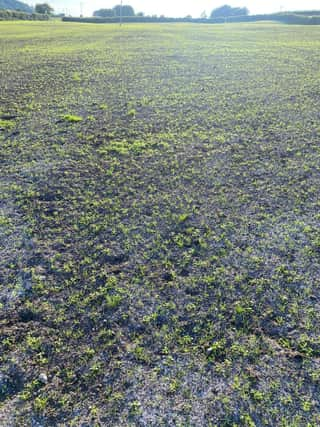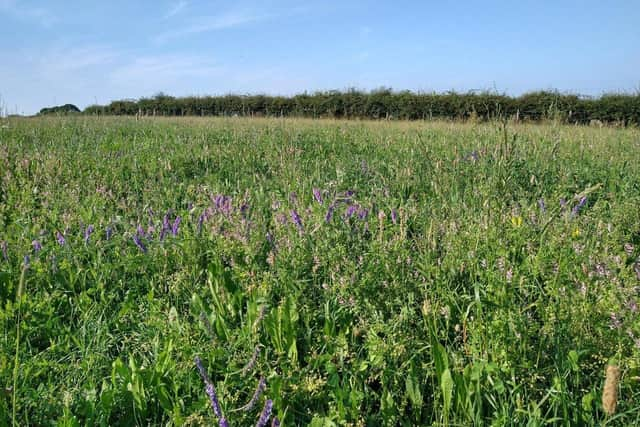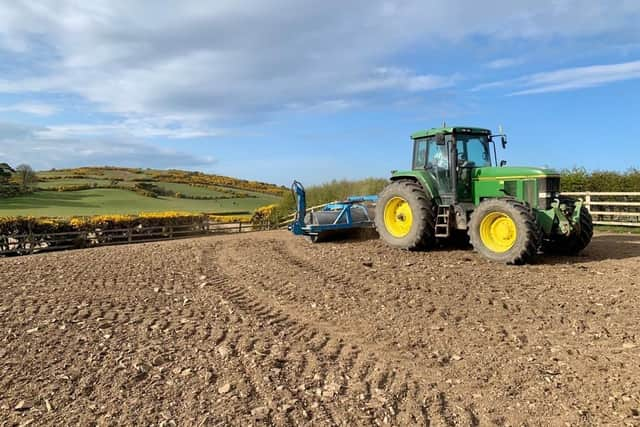Excellent turnout for farmer-focused multi-species sward webinar


Over 170 were in attendance on the night to hear about the experience to date direct from each of the farmers taking part in the Multi-Species Swards (MSS) for Beef and Sheep European Innovation Partnership (EIP) project.
A recording of the webinar is now available to view on the AgriSearch YouTube page for those that weren’t able to attend.
Advertisement
Advertisement
This EIP project, led by farmer-funded research body AgriSearch, commenced in December 2020 to determine the feasibility and practicality of multi-species swards (MSS) on Northern Ireland commercial farms. The EIP project group is comprised of three sheep farmers and three beef farmers working in partnership with technical partners from Agri-Food and Biosciences Institute (AFBI) and Queen’s University (QUB), and jointly funded by the European Agricultural Fund for Rural Development (EAFRD) and the Department of Agriculture, Environment and Rural Affairs (DAERA).


Following an introduction to the EIP project, results from the SUPER-G research project, which preceded the EIP project, were presented with Dr David Patterson detailing the research work at AFBI Hillsborough and Sarah Brown (AgriSearch) sharing the results on farm research trials. At AFBI Hillsborough no difference has been seen to date in the performance (liveweight) of dairy origin calves grazing on MSS vs Grass/Clover swards, however Faecal Egg Counts have been lower in the calves grazing the MSS sward. In the farm trials the Super-G project has found the MSS sward yields on average to be 7% higher than a Grass/Clover yield using 11% less fertiliser.
Having set the scene the webinar then moved to the EIP project and the establishment experiences of each farmer in the group. With some having previously taken part in MSS research trials each of the farms participating within the EIP group were keen to try MSS again but with the option of choosing their own species mix and establishment technique relevant to their specific farming system – something the farmer led EIP approach actively encouraged.
Paul Turley a beef farmer from Downpatrick was the first to present and focused upon sward mix selection having himself established six different sward mixes sown over 40 acres, ranging from a diverse 18 species mix to a simple pure chicory sward and a number in between. Some have fared better than others and have given Paul a good insight into what species and mixes are best suited to his needs. Weeds were a big issue at the start of the establishment process but a change in mindset and perseverance paid off with the swards well established and grazing well by the end of the summer.
Advertisement
Advertisement
In contrast, Roger and Hilary Bell, sheep farmers from Kells, Co. Antrim decided upon a fairly standard six-species mix (PRG, Timothy, Chicory, Plantain, Red Clover, White Clover) over a smaller area but put significant effort into ensuring a successful establishment by using the Stale Seed Bed method. The Stale Seed Bed involved starting standard preparation of the seed bed, before leaving it to allow weed seed germination and removal before sowing the MSS mix. Given ground conditions (drainage and stone removal required) and weather events the process started in April 2021 with seeds in the ground by the end of July 2021 – not a quick process but definitely effective as weeds cannot be sprayed out of a MSS once the sward has been established.


Crosby Cleland a sheep farmer from Saintfield, Co. Down chose a slightly different species mix and a very different establishment method – direct drill. Soil type (clay), climate, sheep palatability, grass heading time and grazing vs. silage were all considerations in the final choice of PRG, Timothy, Chicory, Plantain, White Clover, Red Clover plus Tall Fescue and Cocksfoot.
Running 850 ewes over his 74ha farm grass availability in the spring months is critical especially as drought has been a feature at this time in recent years so establishment of the MSS mix in grazing fields was therefore was left until August. The existing PRG sward was grazed down tight with the sheep before spraying off and direct drilling using criss-cross runs of the Einbock. This was then rolled twice before the sheep were let in again to keep competition down.
Sam and Lauren Chesney, Beef and Sheep farmers from Kircubbin, Co. Down used a more traditional establishment approach but given the tendency in recent years for a dry spring decided to use Redstart as a nurse crop to trap moisture and encourage establishment. A technique also used by Dale Orr an organic sheep farmer from Strangford, Co. Down who also regularly suffers with drought conditions early in the season. Both saw a good establishment with the sward growing well despite the dry conditions with lambs finishing quickly and cattle happily grazing the herbs. More detailed sward management animal performance will however be the focus of the EIP project over the next year.
Advertisement
Advertisement
Jason Rankin (AgriSearch) said: “The webinar was an excellent opportunity for each of the farms involved in the EIP project to showcase the decisions they’ve taken with regards incorporating multi-species swards into their farming systems and the outcomes of their MSS establishment to date. The work each have put into the project so far has been immense and very much appreciated. A lot has been learnt already but more is still to come.”